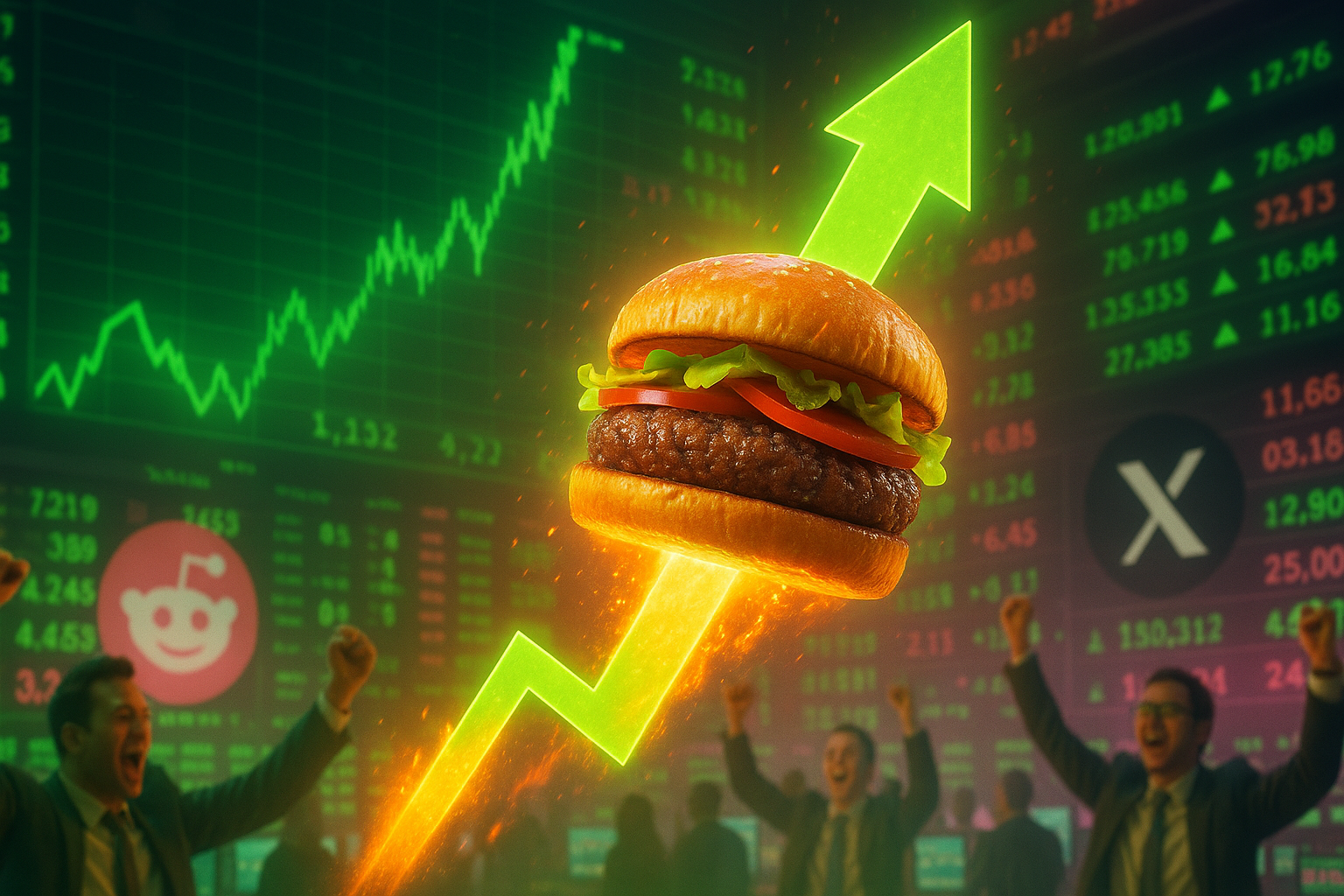The stock market’s underbelly is buzzing again with the kind of frenzied trading that echoes the chaotic days of 2021’s GameStop saga. Back then, retail investors banded together on platforms like Reddit’s WallStreetBets to target heavily shorted stocks, forcing hedge funds into painful short squeezes that sent prices skyrocketing. Fast-forward to October 2025, and a similar phenomenon is unfolding. This time, the poster child isn’t a brick-and-mortar video game retailer but a plant-based meat company that’s been battered by Wall Street for years: Beyond Meat (BYND).
Beyond Meat: The Current Darling of the Short Squeeze Crowd
Beyond Meat’s story is a classic tale of boom, bust, and unexpected revival. The company, known for its vegan burgers and sausages that mimic the taste and texture of real meat, went public in 2019 amid massive hype. Its stock peaked at $239.71 per share in July of that year, valuing the firm at over $14 billion. But as consumer interest in plant-based alternatives waned amid economic pressures and competition, the shares plummeted more than 98% to a low of around $0.50 in mid-October 2025.
What ignited the recent frenzy? A pivotal debt restructuring announced in late September 2025. Beyond Meat launched an exchange offer for its $1.15 billion in zero-interest convertible notes due in 2027, swapping them for new 7% notes due in 2030 and hundreds of millions of new shares. Initially, the market reacted poorly. the dilution from issuing over 316 million new shares sent the stock tumbling 56% in a single day. But this move effectively wiped out most of the company’s debt, reducing net debt by over $800 million and leaving it with about $103 million in unrestricted cash as of Q2 2025. Post-exchange, Beyond Meat’s balance sheet looks cleaner: total debt stands at around $1.26 billion, but with improved liquidity and no immediate maturity cliffs.
This catalyst, combined with sky-high short interest, peaking at over 60% of the float, set the stage for a massive short squeeze. Retail traders piled in, amplified by social media buzz and the stock’s addition to meme-focused ETFs. From its $0.50 low on October 16, BYND rocketed as high as $6.43 by October 22, marking gains of up to 1,200% in just days. Trading volume exploded, with short sellers scrambling to cover positions as the price climbed. Even a partnership expansion with Walmart, rolling out new products to over 2,000 stores, added fuel to the rally.
Fundamentally, this isn’t just hype. The debt wipeout transforms Beyond Meat from a cash-burning entity into one with a fighting chance. It now holds around $103 million in cash, with total assets supporting ongoing operations. While revenues are still declining (down 20% year-over-year in Q2), the company is pivoting to emphasize nutrition and affordability, launching products like a high-protein “Beyond Ground” with minimal ingredients. Short interest remains elevated at about 54% of the float as of late September, keeping squeeze pressure alive.
This mirrors GameStop’s playbook: a beaten-down stock with high short interest, a tangible product (plant-based foods you can buy at grocery stores), and a narrative of Wall Street underestimating retail power. But as with GME, the rally could fizzle if fundamentals don’t catch up, Q3 earnings on November 4 will be telling.
The Criteria for the Next Meme Stock Squeeze
What makes a stock like Beyond Meat primed for this kind of explosion? The playbook is clear, drawing from GME’s blueprint but with a 2025 flavor:
- Tangible, Relatable Products: These aren’t abstract tech plays or biotechs; they’re brands with physical goods that consumers can “touch and feel.” Think everyday items that evoke nostalgia or utility, like food or household gadgets.
- Fallen From Grace: Stocks that had their “day in the sun” during boom times (e.g., pandemic-era hype) but have since been forgotten or pummeled by market forces.
- Extreme Price Decline: A drop of over 90% from all-time highs, creating a low base for explosive upside.
- High Short Interest: At least 20-30% of the float shorted, setting the stage for squeezes when buying pressure mounts.
This formula filters out speculative plays and focuses on undervalued consumer names with real-world appeal. Beyond Meat fits perfectly: plant-based patties that were all the rage in the late 2010s, now trading at a fraction of their peak with massive shorts.
iRobot (IRBT): The Next Potential Squeeze Candidate?
Looking ahead, iRobot Corporation (IRBT) stands out as a prime contender for the next meme-fueled surge. The company, famous for its Roomba robotic vacuums, embodies the criteria perfectly.
A Tangible Product with a Storied Past
iRobot’s flagship Roomba is a household name, a physical gadget that autonomously cleans floors, something millions have touched and used since its debut in 2002. At its peak in the 2010s, Roomba symbolized futuristic home tech, with sales booming as consumers embraced smart homes. But competition from cheaper Chinese brands and supply chain woes eroded its dominance, leaving it somewhat forgotten in a market now obsessed with AI chatbots and EVs.
Dramatic Fall from Grace
iRobot’s stock hit an all-time high of around $197 in early 2019, driven by growth optimism. Today, it trades at about $4.34, a staggering 97.8% decline. The slide accelerated after Amazon’s $1.7 billion acquisition attempt collapsed in January 2024 due to antitrust scrutiny, followed by layoffs, revenue drops, and a “going concern” warning in 2025 amid $227 million in debt and just $41 million in cash.
High Short Interest and Squeeze Setup
With short interest at 26.17% of the 26.58 million share float (8.21 million shares short), IRBT is a tinderbox. Recent trading saw a 45% surge in a single day on October 15, fueled by short covering and no major news—pure momentum. Volume spiked as the stock broke above its 200-day moving average, a technical signal often igniting further gains. On X (formerly Twitter), traders are already buzzing: “I see two short squeeze potential similar to Beyond Meat $BYND: iRobot $IRBT,” one user posted, highlighting charts showing breakout patterns.
Catalysts on the Horizon
iRobot isn’t just drifting, it’s fighting back. In October 2025, CMO Athena Kasvikis declared the company in a “really interesting growth phase,” backed by new AI-powered Roombas with 180x more suction and 75 days of hands-free operation. A global marketing blitz, the first since 2023, aims to rekindle brand buzz. Debt waivers were extended to October 24, buying time for restructuring or partnerships.
Acquisition rumors add intrigue. Speculation of a buyout by Boston Dynamics (Hyundai-owned) has simmered since June, citing synergies in AI mapping and robotics. Co-founder Rodney Brooks’ recent critique of humanoid robots (like Tesla’s Optimus) may subtly signal resistance to such a shift, given his 1.6% stake. If a deal materializes, it could value IRBT at a premium, squeezing shorts hard.
Analysts are mixed: some see existential risks without change, but the low valuation (market cap ~$135 million) makes it a speculative bargain. Forecasts suggest modest upside to $11, but a squeeze could push it higher short-term. X sentiment echoes this: “Heavy short interest + low expectation = potential squeeze setup,” with users eyeing catalysts like a buyout.
In sum, iRobot ticks every box for the next short squeeze: a forgotten icon with a real product, crushed stock, high shorts, and brewing catalysts. Like Beyond Meat, it could erupt if retail momentum builds. But remember, these plays are volatile, fundamentals must ultimately sustain any gains. Investors should watch Q3 earnings for liquidity updates and monitor short interest trends.
A Word of Caution in the Meme Madness
While the allure of quick gains is tempting, meme stock squeezes are notoriously unpredictable and risky. Beyond Meat’s rally could fizzle as fast as it ignited, and regulators are watching closely for manipulation. Always do your due diligence, short squeezes reward the bold but punish the late.
DISCLAIMER: The author did not receive any compensation for publishing this article. The author holds a position in iRobot Corp and may choose to buy or sell shares of the company at any time without notice. The author does not hold positions in any of the other companies mentioned. While reasonable efforts have been made to ensure the accuracy and reliability of the information provided, readers are encouraged to conduct their own research and seek independent financial advice before making any investment decisions related to the companies discussed.


